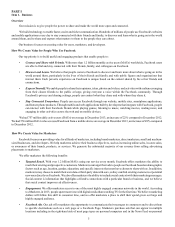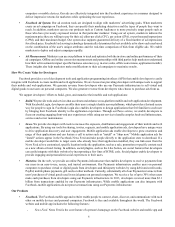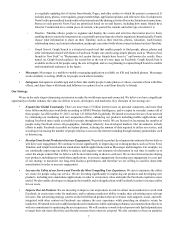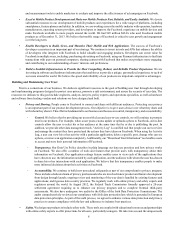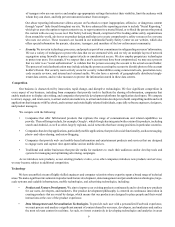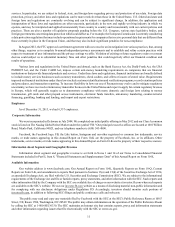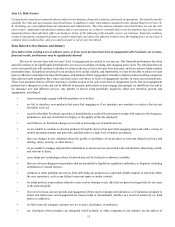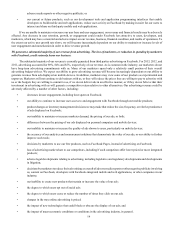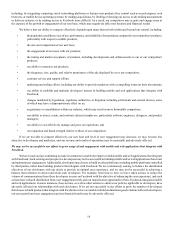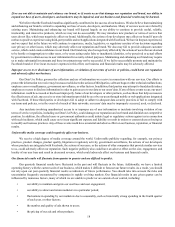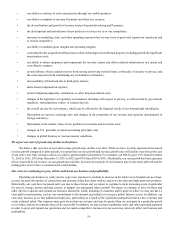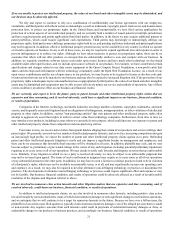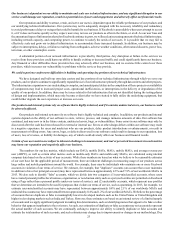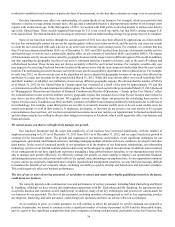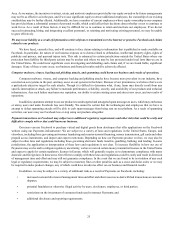Facebook 2013 Annual Report Download - page 17
Download and view the complete annual report
Please find page 17 of the 2013 Facebook annual report below. You can navigate through the pages in the report by either clicking on the pages listed below, or by using the keyword search tool below to find specific information within the annual report.15
The occurrence of any of these or other factors could result in a reduction in demand for our ads, which may reduce the prices
we receive for our ads, or cause marketers to stop advertising with us altogether, either of which would negatively affect our revenue
and financial results.
Mobile advertising is new and evolving and growth in the use of Facebook through our mobile products as a substitute for use on
personal computers may negatively affect our revenue and financial results.
We had 945 million mobile monthly active users (MAUs) in December 2013. While most of our mobile users also access
Facebook through personal computers, we anticipate that the rate of growth in mobile usage will continue to be the primary driver of
our growth for the foreseeable future and that usage through personal computers will decline worldwide, including in key markets
such as the United States and other developed markets in Europe and Asia. For example, during the fourth quarter of 2013, the number
of mobile MAUs exceeded the number of MAUs using personal computers for the first time, and the number of MAUs on personal
computers declined relative to the third quarter of 2013. While our mobile advertising revenue continues to grow and comprised over
half of our overall advertising revenue in the fourth quarter of 2013, the mobile advertising market remains a new and evolving market.
In addition, we do not currently offer our Payments infrastructure to applications on mobile devices. If users increasingly access
Facebook mobile products as a substitute for access through personal computers, and if we are unable to continue to grow mobile
revenues or successfully monetize mobile users, or if we incur excessive expenses in these efforts, our financial performance and
ability to grow revenue would be negatively affected.
Facebook user growth, engagement, and monetization on mobile devices depend upon effective operation with mobile operating
systems, networks, and standards that we do not control.
There is no guarantee that popular mobile devices will continue to feature Facebook, or that mobile device users will continue
to use Facebook rather than competing products. We are dependent on the interoperability of Facebook with popular mobile operating
systems that we do not control, such as Android and iOS, and any changes in such systems and terms of service that degrade our
products' functionality, give preferential treatment to competitive products, or prevent our ability to show ads could adversely affect
Facebook usage and monetization on mobile devices. Additionally, in order to deliver high quality mobile products, it is important
that our products work well with a range of mobile technologies, systems, networks, and standards that we do not control. We may
not be successful in developing relationships with key participants in the mobile industry or in developing products that operate
effectively with these technologies, systems, networks, or standards. In the event that it is more difficult for our users to access and
use Facebook on their mobile devices, or if our users choose not to access or use Facebook on their mobile devices or use mobile
products that do not offer access to Facebook, our user growth and user engagement could be harmed.
Our business is highly competitive. Competition presents an ongoing threat to the success of our business.
We face significant competition in every aspect of our business, including from companies that provide tools to facilitate the
sharing of information, companies that enable marketers to display advertising and companies that provide development platforms
for applications developers. We compete with companies that offer full-featured products that replicate the range of communications
and related capabilities we provide. These offerings include, for example, Google+, which Google has integrated with certain of its
products, including search and Android, as well as other, largely regional, social networks that have strong positions in particular
countries. We also compete with companies that develop applications, particularly mobile applications, that provide social functionality,
such as messaging, photo- and video-sharing, and micro-blogging, and companies that provide web- and mobile-based information
and entertainment products and services that are designed to engage users and capture time spent online and on mobile devices. In
addition, we face competition from traditional and online businesses that provide media for marketers to reach their audiences and/
or develop tools and systems for managing and optimizing advertising campaigns.
Some of our current and potential competitors may have significantly greater resources or better competitive positions in certain
product segments, geographic regions or user demographics than we do. These factors may allow our competitors to respond more
effectively than us to new or emerging technologies and changes in market conditions. We believe that some of our users, particularly
our younger users, are aware of and actively engaging with other products and services similar to, or as a substitute for, Facebook,
and we believe that some of our users have reduced their engagement with Facebook in favor of increased engagement with these
other products and services. For example, in the third quarter of 2013, the best data available to us suggested that while usage by U.S.
teens overall was stable, DAUs among younger teens in the United States had declined. In the event that our users increasingly engage
with other products and services, we may experience a decline in user engagement in key user demographics or more broadly and
our business could be harmed.
Our competitors may develop products, features, or services that are similar to ours or that achieve greater acceptance, may
undertake more far-reaching and successful product development efforts or marketing campaigns, or may adopt more aggressive
pricing policies. In addition, developers whose mobile and web applications are integrated with Facebook may use information shared
by our users through Facebook in order to develop products or features that compete with us. Certain competitors, including Google,
could use strong or dominant positions in one or more markets to gain competitive advantage against us in areas where we operate,


